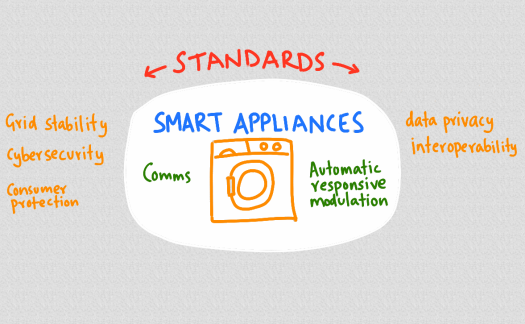
The appliances in our houses - washing machines, fridges and air conditioners - have a key role to play in the transition to a low-carbon economy.
Electric vehicles and electrification of heat could increase peak demand from 60-70 GW now by 18 GW by 2020.
That will need around 6 new nuclear reactors the size of Hinkley Point C and a huge investment in additional network reinforcement.
Smart appliances that can change when they use electricity could reduce that additional demand from 18 GW to only 6 GW, according to a government consultation on smart appliances that runs from March to June 2018.
The consultation is looking at defining standards - the principles and associated functionalities required for smart appliances - to give industry something to aim for.
A smart appliance is, according to the policy, a product which:
- Has communications: It can connect to a network and communicate
- Is flexible: It can change how it uses electricity based on a signal like price (automatic, responsive modulation)
The standards will not apply to all products - only the ones with the most potential for flexibility. In particular, lighting and cooking are not included.
The kinds of products that could be smart are:
- Cold appliances: fridges, freezers
- Wet appliances: Washing machines, dryers, dishwashers
- Heating: Electric heaters, controls, heat pumps, air conditioners
- Battery storage: Standalone or combined storage like PV-Solar systems
The standards for smart appliances look at five key areas.
It's important that people can choose brands of product without having issues with how their machines talk to each other.
Open standards that promote interoperability help with this - and using a common data model that has a standard instruction set is a preferred approach in the policy for communications between machines and between machines and their controllers.
The point about smart appliances is that they help with grid stability, for example by shifting when they are on away from times when there is lots of stress on the grid.
Clearly, they can also do the opposite: add load to the grid if misused and put more stress on the grid - potentially leading to faults and blackouts.
So, cyber security is an essential part of all internet connected devices these days to make sure this doesn't happen.
A secure by design approach is a recommended one.
The appliances will create and store data so data privacy requirements will be in the standards.
Finally, when it comes to consumer protection, the standards will cover product safety and end-of-life process - and these will cover how the physical product is recycled and how the data on the system is handled.
Products that comply with the standard will have a label, and the standards will also be aligned with what is happening internationally.
A smart energy system could save taxpayers £17-40 billion to 2050, so many people will be watching this space with interest over the coming years.
You've come to the right spot if you've visited a Lowe's website and are wondering how to participate in a Lowe's customer survey. This survey may provide you with all of the information you need about lowescom survey its benefits, and much more. Lowe's performs a customer survey on their own website to track customer experiences and improve based on their feedback.
Downvoting a post can decrease pending rewards and make it less visible. Common reasons:
Submit
Hey. When it comes to cleaning and keeping your home clean, everyone wants a reliable device that will make the process much easier. This is why many people buy vacuum cleaners and other cleaning devices from Shark, which have proven themselves to be excellent. By studying the information here https://shark.pissedconsumer.com/customer-service.html everyone will understand that with the help of these devices, cleaning the house is very easy, and the quality of cleaning is significantly improved.
Downvoting a post can decrease pending rewards and make it less visible. Common reasons:
Submit